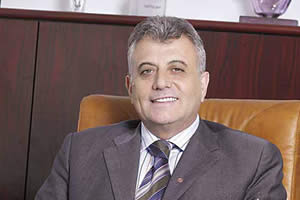Testing the water
State-owned hydro power company Hidroelectrica is entering the capitalist age by raising funds through privatisations and the stock exchange, explains general director Traian Oprea
 |
|
|||||||||||||
One of the main pillars of the Communist energy strategy, hydro power, has retained its place as a trusted source of power generation in a post-1989 Romania. From 12 subsidiaries located throughout the country, the state energy company Hidroelectrica provides between 22 to 33 per cent of the nation’s electricity demand through a ‘green’ resource. The keystone is Portile de Fier [The Iron Gates], a 1970s joint venture between Romania and then Yugoslavia, which is located on the Danube river in Caras Severin county and administered in co-operation with Serbia.
But Hidroelectrica is now raising funds for a massive modernisation programme using a listing on the stock exchange and the sales of its smaller assets. The Government has also made statements that it will create a giant energy company, which could swallow up Hidroelectrica with other state-owned power generation firms – although the details of this concept are still unclear.
Hidroelectrica is now selling almost 70 micro hydro power stations from 150 ready for privatisation, under an agreement with the European Union. Since 2007 the company has directly sold 81 micro hydro power stations and intends to finish this process by the middle of 2009.
“Next September or October at the latest, we plan to sell a few more hydro plants,” Traian Oprea, general director of Hidroelectrica, tells The Diplomat.
So far 48 units have been bought by Romanian companies and the remaining 33 have been acquired by foreign companies including those from Italy, Austria, Portugal, France and Germany. “European companies showed more interest in these stations than other private investors,” says Oprea.
When the privatisation process ends, Hidroelectrica will continue to administrate 205 hydro power stations. A micro hydro power station has an installed power capacity lower than ten MW, but the stations sold by Hidroelectrica had approximately around one MW per unit. The price for these was, on average, one MW of power for three million Euro. The installed power capacity of the 150 micro hydro power stations is only 2.1 per cent of the total of the company.
“As the micro hydro power stations are sold to private investors, this money will be invested in the modernisation of the company’s production facilities,” says the general director.
Hidroelectrica’s development strategy between 2005 and 2025 aims to boost the country’s hydro energy from 48 per cent to reach 62 per cent of the national potential by developing new production facilities. Oprea hopes that Hidroelectrica will be able to attract private companies to develop both green- and brown-field investments in Romania. The state company also intends to expand its portfolio of production by developing projects in wind power.
The modernisation of old production capacities and, at the same time, building new ones will help the company to develop 400 MW more by 2011, increasing the installed energy capacity of Hidroelectrica by six per cent.
However the Ministry of Economy and Finance has plans to add Hidroelectrica to its national energy champion project, which includes other state-owned energy companies which have escaped full-scale privatisation. Electricity distribution companies Electrica Muntenia Nord, Electrica Transilvania Sud and Electrica Transilvania Nord are along with thermopower producers Rovinari and Turceni are planned to be part of the energy company.
“This project could be interesting for Hidroelectrica as long as the new company is designed to have a holding organisational structure,” says Oprea.
Cashing in
Between 2009 and 2012 Hidroelectrica has an extensive modernisation programme which requires investments of around 350 million Euro per year.
To help fund this, Hidroelectrica is preparing to list a minority stake on the Bucharest stock exchange. Hidroelectrica’s owner, the Ministry of Economy and Finance, will decide the details of the sale. Only ten to 15 per cent of the total shares are planned to be sold on the stock exchange market in the first instance, due by the end of 2009.
The Government does not intend to list a majority share package of the company because it wants Hidroelectrica to remain in the state’s hands.
The power company’s turnover last year was 560 million Euro compared to 643.7 million Euro in 2006. This loss was due to the drought between September 2006 and October 2007, says Oprea. The predicted turnover for 2008 is 547.25 million Euro, while total spending reached 556.85 million Euro.
But a loss for a state company of only 9.6 million Euro is no tragedy.
Interview by Ana Maria Nitoi

















